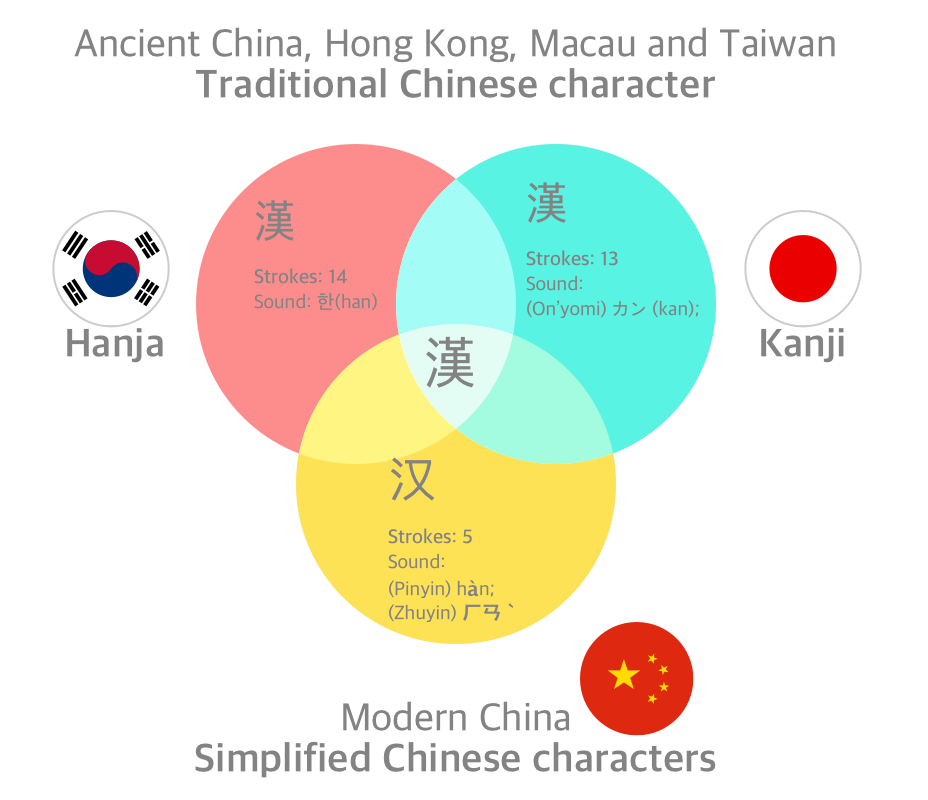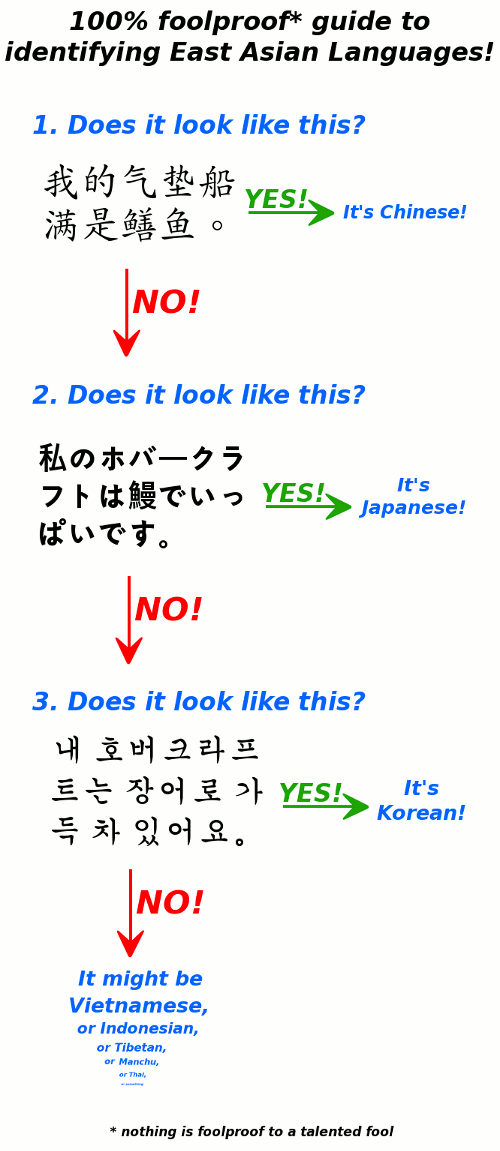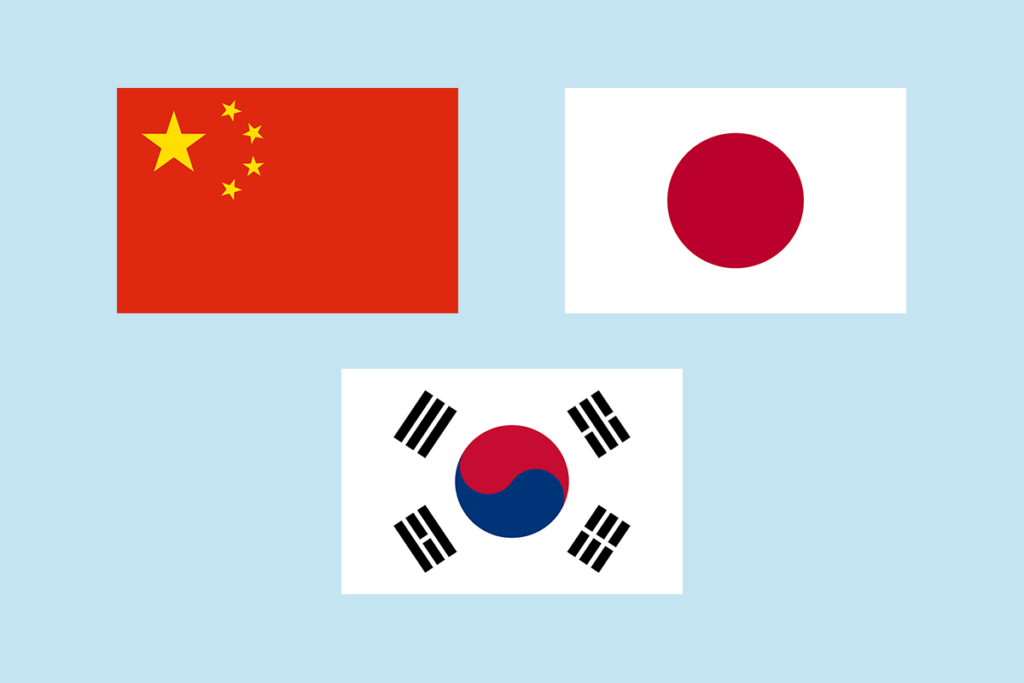In kun yomi the. Since the Japanese language was originally derived from Chinese Chinese language is the older of the two.

How To Master All Three Languages Chinese Japanese And Korean By Chris Lee Story Of Eggbun Education Medium
3 rows Chinese Language.

Chinese in japanese language. These differences are particularly profound in words with grammatical significance. More Japanese words for Chinese language. The key point here is that we add the word Go at the end of each language.
What is more unlike in many European languages there are no tenses case endings agreements etc. Here the english translation of that chinese word and audio file mp3. In on yomi derived from the Chinese you say san.
The pronunciation of this character in Chinese is sh n in the first tone. What is the difference between Chinese and Japanese Languages. Chinese characters were introduced to Japan during a few centuries when the development of Japanese characters was laggingThat made Chinese characters used in Japanese with same meanings but.
A country known for manga anime sushi and samurai Japan is a country whose culture was heavily influenced by China and the Chinese language. Japan made these terms in order to translate Western concepts into Japanese. Chinese and Japanese tend toward different sentence structures.
In contrast Japanese uses no tones and is much more simplistic in its pronunciation. The three systems are used interchangeably and all three systems can often be found in the same sentence. Kanji is the Japanese variation of Chinese characters and shows the meaning of Japanese words.
Known as wasei-kango these words were made in Japan and later were adopted into Chinese in the late 19 th and early 20 th Centuries. Ni ji nanji - Chinese for you. There are Chinese words that dont exist in Japanese and many Chinese Kanji have different meanings or pronunciations as well as occasionally being written slightly differently.
How to say Chinese language in Japanese. Chinese Japanese language difficulty comparison - YouTube. Japanese grammar is often seen as more complex than its Chinese counterpart.
Chinese is written in Hanzi. Hiragana katakana and kanji.
Lets take a look at these 30 Japan-made Chinese. Hanzi and kanji. Language structure and word order in Chinese are easier than in Japanese or Korean for English speakers or speakers of European languages.
Go means language in Japanese. Knbn kanpban AmE approx. Japanese uses three separate writing systems.
Here are the different foreign languages and how we would call them in Japanese. The word order is very often more similar to what were used to. What is related to Chinese is the characters in Japanese.
In Mandarin Chinese the most widely used dialect of Chinese there are four tones. For example ma can be four different words depending on the tone m mother m hemp m horse m scold. Now in Japanese the word for mountain is yama.
In Japanese the reading derived from Chinese is called on yomi while the original Japanese pronunciation is called kun yomi. The Japanese language has evolved over time Japanese in Modern Times. The pronunciation in pinyin is written ryor ri4yu3.
It refers to the Chinese characters that both languages make use of in their writing systems. In addition a couple of them are about Japanese concepts a good example is a Japanese-origin food. Japanese is written in.
Japanese language and Chinese language are completely different languagesThey have different origins and different developments. To say mountain the Chinese use the pictograph which depicts a mountain with three peaks. The Japanese then created new words using Chinese characters.
In 1902 the government announced its desire to establish a standard language based on the language spoken in the middle class of Tokyo. Japanese pronunciation is easier than Chinese pronunciation. For example the Chinese character which in Chinese is pronounced shan and means mountain is also found in Japanese with two ways of saying it.
The Let it go in 25 different language inspired me to write this article. For instance in Japanese verbs and adjectives are often combined. Hiragana and katakana are phonetic systems and show the pronunciation of Japanese words.
Differences in the Chinese and Japanese character sets today East Asia Student 2013630 Hanzi and kanji are the Chinese and Japanese pronunciations of the term that is used in both languages. While Japanese is an SOV language subject object verb Chinese is an SVO language subject-verb-object. In Japanese the characters originally borrowed from the Chinese language are called Kanji.
Chinese Characters in Japanese.

How Different Is Japanese Language From Chinese By Cecilia Humlelu Medium
As A Japanese Speaker Which Language Is Easier To Learn English Or Chinese Quora
How To Tell The Difference Between The Japanese And Chinese Languages Quora

Mandarin Chinese Or Japanese Or Korean 6 Helpful Criteria

Easy Ways To Identify Asian Languages Funsubstance Com Learn Japanese Words Japanese Phrases Japanese Language

Interpretation In Chinese Japanese Korean Languages Chinese Language Translator Interpreter In Bangalore Service Provider From Delhi

Characters Which Have Several Different Shapes Chinese Language Stack Exchange

How To Tell The Difference Between Chinese Japanese And Korean East Asia Student

Korean Writing Korean Words Learning Korean Words

3 Ways To Distinguish Between Japanese And Chinese Cultures
Languages And Chinese Characters On The Web Growing With The Web
Difference Korean Chinese Japanese Language Hno At

Chinese Japanese Korean A Language Comparison Bilingua
What Languages And Dialects Use Chinese Characters Quora
Difference Korean Chinese Japanese Language Hno At

Can The Chinese Actually Understand The Japanese And Korean Languages
Are There Any Similarities Between The Japanese The Chinese And The Korean Language And Script Quora

The Differences Between Japanese Korean And Chinese Learn Japanese Words Japanese Phrases Japanese Language

Post a Comment
Post a Comment